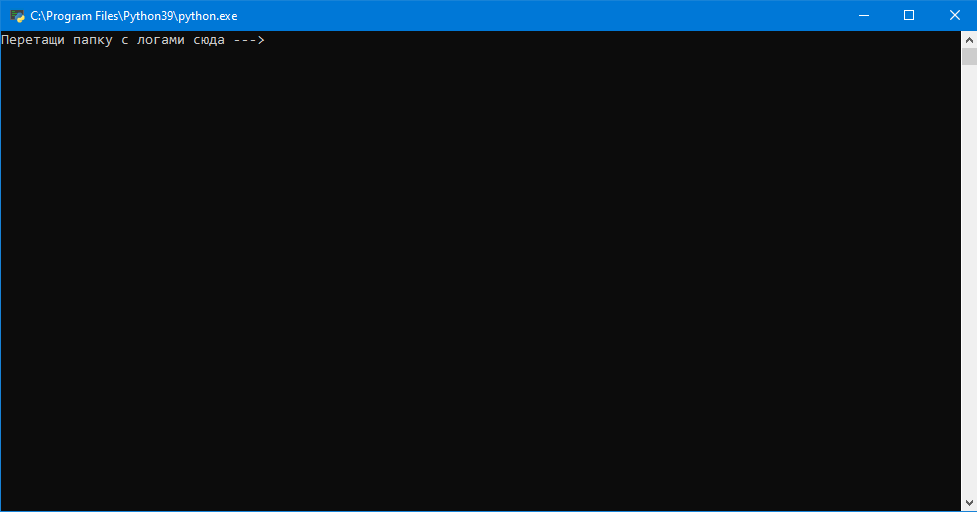- Joined
- Jan 8, 2019
- Messages
- 56,623
- Solutions
- 2
- Reputation
- 32
- Reaction score
- 100,456
- Points
- 2,313
- Credits
- 32,750
6 Years of Service
76%

This is the Python source code that you can use to pull the URL:LOGIN
If possible and when I have free time, I will refine the script. Write your wishes in the topic.
The software was not packaged on purpose so that you could see that the code was clean.
1. Download and install Python on your computer (e.g.
This link is hidden for visitors. Please Log in or register now.
2. Download the contents of the script and save it on your computer to a file with the .py extension, for example, main.py
3. On line 11 of the script, specify the path to your log folder in quotation marks
4. Run via command line: python *your_filename*.py (e.g. python main.py)
Python:
import datetime
import os
from random import randint
from string import ascii_letters, digits, punctuation
all_symbols = ascii_letters + digits + punctuation
path_to_logs = input("Перетащи папку с логами сюда ---> ")
count_files = 0
set_data = set()
for dirpath, _, filenames in os.walk(path_to_logs):
for filename in filenames:
if filename == 'Passwords.txt':
count_files += 1
name_file_passwords = os.path.join(dirpath, filename)
print(f'[{count_files}] Обрабатываем файл: {filename}')
with open(file=name_file_passwords, mode='r', encoding='UTF-8', errors='ignore') as file_log:
list_rows = [x.strip() for x in file_log.readlines()]
for x in list_rows:
if x.startswith('URL:'):
index_this_row = list_rows.index(x)
url_from_row = x.split('URL:')
if len(url_from_row) > 1:
value_url = url_from_row[1].strip()
value_url = value_url.lstrip(':').strip()
if (not value_url.startswith('android') and not value_url.startswith('http://192.168')
and not value_url.startswith('chrome') and not value_url.startswith('about:blank')
and not value_url.startswith('file') and not value_url.startswith('http://10.0.0')
and not value_url.startswith('moz-proxy') and not value_url.startswith('vivaldi')
and not value_url.startswith('http://localhost')
and not value_url.startswith('http://127.0.0.1')):
get_username_next_row = list_rows[index_this_row + 1]
if get_username_next_row.startswith('Username:'):
username_from_row = get_username_next_row.split('Username:')
if len(username_from_row) > 1:
value_username = username_from_row[1].strip()
if value_username != 'UNKNOWN':
get_password_next_row = list_rows[index_this_row + 2]
if get_password_next_row.startswith('Password:'):
password_from_row = get_password_next_row.split('Password:')
if len(password_from_row) > 1:
value_password = password_from_row[1].strip()
for char in value_username:
if char not in all_symbols:
break
else:
for char in value_password:
if char not in all_symbols:
break
else:
set_data.add(f'{value_url}:{value_username}:{value_password}')
today_day = datetime.date.today().day
today_month = datetime.date.today().month
today_year = datetime.date.today().year
now_hour = datetime.datetime.now().strftime('%H')
now_minute = datetime.datetime.now().strftime('%M')
rand_int = randint(1, 1000000)
add_time_moment_row = f'{today_day}_{today_month}_{today_year}_{now_hour}_{now_minute}_{rand_int}'
filename_unique_data = f'new_data_from_logs_{add_time_moment_row}.txt'
len_set_passwords = len(set_data)
print(f'Найдено [{len_set_passwords}] строк')
list_data = list(set_data)
list_data.sort()
if len_set_passwords > 0:
with open(file=filename_unique_data, mode='w', encoding='UTF-8', errors='ignore') as _file_out:
for yy in list_data:
_file_out.write(f'{yy}\n')
else:
print('Пароли не найдены!')
Last edited: